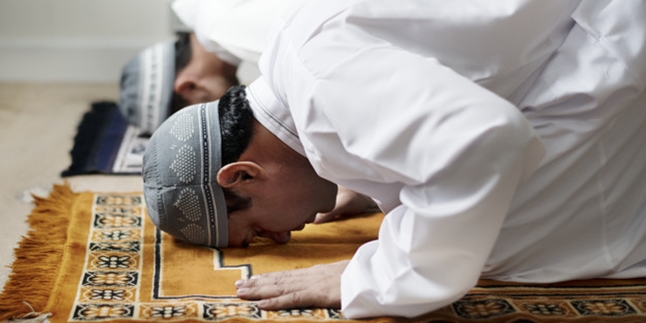10 Homemade Es Kuwut Recipes, Refreshing Takjil for Ramadan Fasting
This is the recipe for homemade es kuwut, a refreshing takjil for Ramadan fasting.

Kapanlagi.com - Prayer is a worship that must be done by every Muslim. It is obligatory for every Muslim to perform it in order to be closer to Allah SWT. Muslims have 5 obligatory prayer times that must be performed, and there are also voluntary prayers that can be done to perfect worship to Allah SWT. One of them is the muakkad sunnah prayer, which is a supplementary voluntary prayer.
Actually, the ruling of performing voluntary worship is that if the worship is done, a person will be rewarded. But if it is not done, then the person will not be punished. For KLovers who want to perfect their worship to Allah SWT, of course, they will diligently perform voluntary prayers after performing obligatory prayers.
READ ALSO: Tata Cara Sholat Idul Fitri, Ketahui Niat Bacaan Dan Jumlah Rakaatnya
For those of you who want to learn the meaning of muakkad sunnah prayer, here is the definition, types, and provisions of muakkad sunnah prayer that have been compiled from various sources. Let's check it out, KLovers.

Illustration (credit: Freepik)
According to the book Fikih Empat Madzhab by Sheikh Abdurrahman Al Juzairi, according to the Malikiyah scholars, Sunnah is what is commanded by the legislator, then the command has noble value and is emphasized to be placed upon the congregation or followers.
Meanwhile, the ruling of performing Sunnah worship is that if the worship is performed, then a person will receive rewards. However, if it is not performed, then the person will not receive sins. In practice, Sunnah worship is divided into two, namely Sunnah Muakkad and Sunnah Ghairu Muakkad.
Based on the study of Ushul Fiqh, Sunnah Muakkad is a recommended Sunnah practice that is performed to perfect an obligatory worship and is recommended to be done because its level is almost close to obligatory worship. Sunnah Muakkad is considered a way to perfect a worship. Because when someone performs a Fardh prayer, there may be parts of the Sunnah that they do not perform, thus reducing their rewards.
Sunnah Muakkad can also be understood as a highly recommended practice to be performed because it was never abandoned by the Prophet Muhammad SAW. Only once or twice did he leave it to show his ummah that the worship is not obligatory.

Illustration (credit: Freepik)
After knowing the meaning of sunnah muakkad prayers, you also need to know the types of sunnah muakkad prayers. And here are some types of sunnah muakkad prayers:
1. Rawatib Prayers
Rawatib prayers can complement the obligatory prayers, including:
- Two rak'ahs before performing the dawn prayer (qabliyah)
- Two rak'ahs before performing the noon prayer (qabliyah)
- Two rak'ahs after performing the noon prayer (ba'diyah)
- Two rak'ahs after performing the evening prayer (ba'diyah)
- Two rak'ahs after performing the night prayer (ba'diyah)
2. Night Sunnah Prayers
The sunnah muakkad prayers that are obligatory to perform at night are:
- Witr Prayer
- Tahajud Prayer
- Tarawih Prayer during Ramadan
- Prayer on Eid al-Fitr and Eid al-Adha
- Eclipse Prayer
- Rain Prayer
3. Tahiyatul Masjid Prayer
Tahiyatul Masjid prayer is a two-rak'ah sunnah prayer that is performed when a person enters the mosque.
4. Dhuha Prayer
Dhuha prayer is performed by a person when entering the time of dhuha. The time of dhuha is when the sun starts to rise approximately 7 hasta from sunrise until it begins to enter the noon time.
5. Hajat Prayer
This prayer is performed by a Muslim when they have a specific need and want it to be granted by Allah SWT. Hajat prayer is performed between 2 and 12 rak'ahs with salam after every 2 rak'ahs. This prayer can be performed at any time except during the prohibited prayer times.
6. Awwabin Prayer
Awwabin itself comes from the Arabic language which means (people who often repent). There are different opinions among scholars regarding this prayer. Some say that Awwabin prayer is performed between Maghrib and Isha time, while others say that Awwabin prayer is another name for Dhuha prayer.
7. Tasbih Prayer
Tasbih prayer is a voluntary prayer that recites the tasbih phrase ("Subhanallah wal hamdu lillahi walaa ilaaha illallahu wallahu akbar") 300 times. In 4 rak'ahs, recite the tasbih phrase 75 times each. This prayer was taught by the Prophet Muhammad SAW to his uncle, Abbas bin Abdul Muthallib. However, there are different opinions among scholars about this.
8. Repentance Prayer
Repentance prayer is a voluntary prayer performed by a Muslim when they want to repent for the mistakes they have made. Repentance prayer is performed in two rak'ahs and can be done at any time except during the prohibited prayer times.

Illustration (credit: Freepik)
And finally, there are provisions for performing sunnah muakkad prayers. And these provisions must be fulfilled in order for your prayers to be valid. Here are some provisions for performing sunnah muakkad prayers:
- Not preceded by the call to prayer (adhan) and the call to stand (iqamah), except for the rawatib prayers.
- Performed individually (munfarid), except for the prayers on the two Eids.
- Started with the intention according to the type of prayer.
- Consists of two units (raka'at) with one salutation (salam).
- Perform the sunnah prayers in a different place from the obligatory prayers.
- Recite in a whisper.
That is the understanding of sunnah muakkad prayers along with their types and provisions. Hopefully, by knowing about sunnah muakkad prayers, you can further perfect your prayers to Allah SWT.
(kpl/dhm)
Cobain For You Page (FYP) Yang kamu suka ada di sini,
lihat isinya
This is the recipe for homemade es kuwut, a refreshing takjil for Ramadan fasting.
Here are some easy ways to prevent uneven skin tone for hijabi women
A number of delicious and savory tahu walik recipes can be used as a reference for snacks during iftar or as a meal companion. Let's check out the review, KLovers!
There are various tempe dishes that are quite appetizing with their typical spice flavor. Let's check out the reviews below KLovers!
Without further ado, here are the words for arrogant friends as a way to enlighten them with simple and wise advice.
An adult will face problems in life wisely. Wise adult words can be a provision and guidance to behave more wisely.
There are many types of dishes that can be made from chicken, one of which is curry. Chicken curry recipe can be the main menu for processing chicken into delicious food.
Without further ado, check out these practical mackerel recipes, delicious creations for sahur and buka puasa menu.
In addition to being easily found in several street vendors, lontong sayur recipe is actually quite easy to make yourself. Let's check out the review, KLovers!
These are the 8 virtues of completing the Quran in the holy month of Ramadan. What are the virtues? Let's check them out KLovers.
In Islam, the virtue of prayer is truly extraordinary. Prayer is not only a way to ask Allah SWT. More than that, with prayer, a Muslim can get closer to their creator.
Mie tek tek can be prepared by boiling (wet) or frying (dry). Here is the simplest mie tek tek recipe.